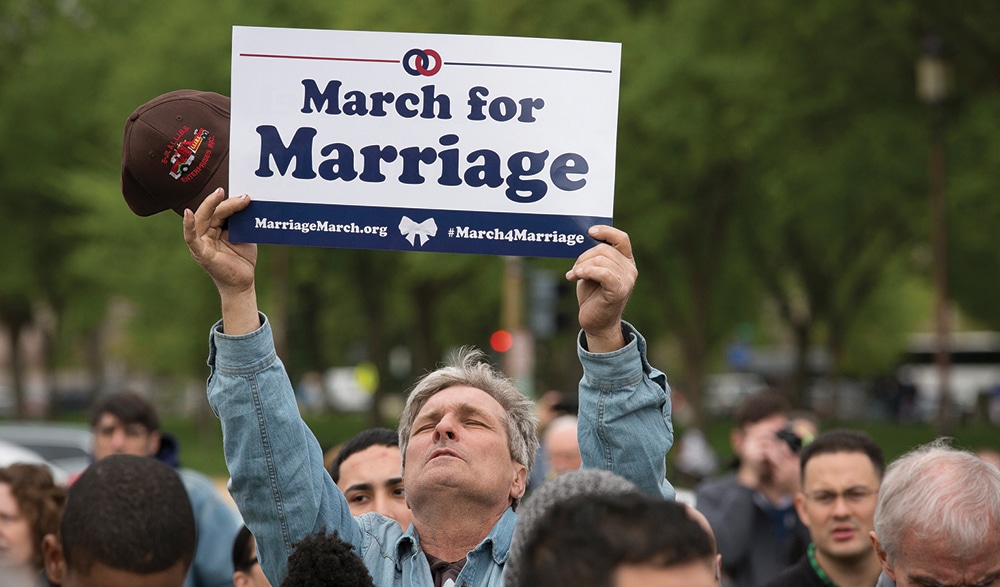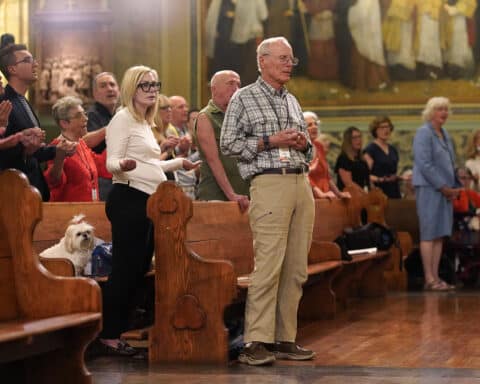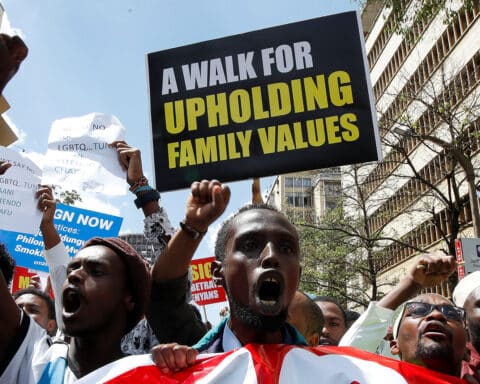Readers of The Washington Post were treated several Sundays ago to an op-ed diatribe by columnist David Von Drehle in which he assailed “finger-pointing bedroom police” who have the nerve to say — as nearly all Christians and Jews have said until quite recently — that homosexual sex is wrong. His special targets were “traditional Catholics battling at the crumbling ramparts of a discredited hierarchy” and conservative United Methodists, who at the time he wrote had recently reaffirmed their church’s opposition to same-sex marriage at a special conference convened to discuss the matter.
Von Drehle’s rant was neither new nor unusual. It simply echoed the by-now-familiar anathemas regularly hurled by the journalistic hit men and women of media like the Post and The New York Times at dissenters from the secular orthodoxy that demands approval of homosexual sex. Countercultural is an overworked word, but in withholding assent from the totality of the LGBTQ agenda, the holdouts, and especially the Catholic Church, are standing against a central dogma of contemporary secular culture. Despite the criticism, though, the Church believes it has no choice except to serve what it sees to be people’s best interests — not just temporal interests either but eternal ones — by speaking the truth that some sexual acts, including those between two people of the same sex, are seriously wrong because they conflict with God’s plan for the right use of sex.
Church teaching
The Church’s teaching on homosexuality is easily stated. Calling homosexual acts “intrinsically disordered,” the Catechism of the Catholic Church says such acts “are contrary to the natural law. They close the sexual act to the gift of life. They do not proceed from a genuine affective and sexual complementarity” (No. 2357). But the Catechism also says homosexuals “must be accepted with respect, compassion, and sensitivity,” adding that by the practice of “self-mastery,” together with friendly support and God’s grace, “they can and should gradually and resolutely approach Christian perfection” (Nos. 2358-59).
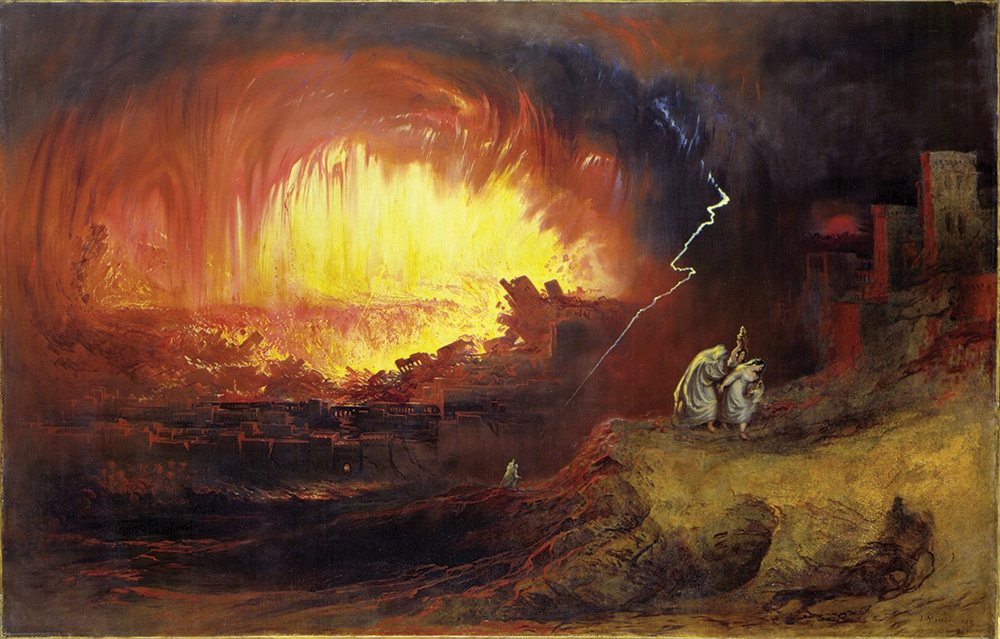
The Catechism of the Catholic Church was published in 1992 with the approval of Pope St. John Paul II. But Christian and Jewish teaching that homosexual acts are wrong goes back centuries before that. In the Old Testament, the topic is treated in chapters 18 and 19 of the Book of Leviticus, where homosexual sex is termed an “abomination.” It also is covered in the story of Sodom and Gomorrah in Genesis 19. Although some exegetes have argued that the sin condemned there is inhospitality, the account makes it clear that the inhospitable behavior of the men of Sodom was to demand that visitors to their city engage in the activity to which Sodom has given its name.
Although in the Gospels Jesus says nothing directly about homosexuality, a judgment — that there is something about it that is not as the maker originally intended — is implicit in what he says about marriage: “Have you not read that from the beginning the Creator ‘made them male and female'” (Mt 19:4). The New Testament’s most outspoken voice on this subject is, however, St. Paul. His first letter to the Corinthians includes practicing homosexuals in the list of those who “will not inherit the kingdom of God” (1 Cor 6:9), while in the first chapter of his letter to the Romans, Paul says those who engage in homosexual acts mirror the self-inflicted blindness of people who turn away from the evidence for the true God present in creation and instead worship the false idols of paganism (Rom 1:20-27).
This remained Church teaching in the centuries that followed. St. Augustine and St. Thomas Aquinas both condemned homosexual sex. Another notable witness to this tradition is St. Peter Damian, an 11th-century Church reformer, who published a book calling on Pope St. Leo IX to root out homosexuality among the clergy.
Social change
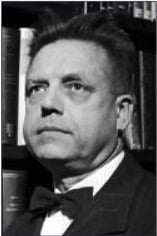
Society at large condemned homosexual behavior until recently. But a great change set in shortly after World War II. A key figure in what started happening then was sex researcher Alfred C. Kinsey, who in 1947 founded an Institute for Sex Research at Indiana University and the next year published a book called “Sexual Behavior in the Human Male,” followed in 1953 by “Sexual Behavior in the Human Female.”
Although the methodology of Kinsey, a bisexual who engaged in sexual activity with men, has been criticized (among other things, he drew much of his data from interviews with jailed sex offenders), the Kinsey Reports, as they became known, caused a sensation in their day by seemingly showing that previously condemned sexual behavior was much more widespread than commonly supposed.
Making its own contribution to the shift in attitudes was the American Psychiatric Association. In the first edition of its Diagnostic and Statistical Manual of Mental Disorders, published in 1952, it included homosexuality among the disorders. But the psychiatric association no longer included homosexuality in a new edition that appeared in 1973, following the uproarious 1960s. “Homosexuality per se implies no impairment in judgment, stability, reliability, or general social or vocational abilities,” it explained. The American Psychological Association followed suit in 1975.
Critics view these switches as instances of what the late Daniel Patrick Moynihan called “defining deviancy down” — extending approval to a previously disapproved behavior by redefining what is unacceptable in such a way that the disapproved behavior meets the test of acceptability.
But by far the largest factor in the sea change was the sexual revolution that took place in the 1960s and 1970s, which saw previous norms of sexual morality set aside in favor of a new permissiveness. The shift since then is now apparent in many ways, notably including the Supreme Court’s 2015 decision that same-sex couples have a constitutionally protected right to marry.
Even so, the number of Americans self-identifying as LGBT remains fairly low. According to Gallup polling, the figures in 2017 ranged from 1.4% among those born between 1913 and 1945, to 8.2% among those born between 1980 and 1999. Opinion polls nevertheless also regularly find much higher percentages expressing approval for gay-friendly laws — a predictable result, given the ongoing deluge of pro-gay messages communicated to the public via popular media.
20th-century response
One symptom of change in attitudes on sexual morality was the widespread dissent among theologians and ordinary Catholics from Pope St. Paul VI’s 1968 encyclical Humanae Vitae, which reaffirmed the Church’s condemnation of artificial contraception. But although many churches have gone with the tide and taken stands on the side of permissiveness in matters having to do with sex, the Catholic Church, despite criticism from without and dissent from within, has not.
In modern times there have been several important Church statements specifically on homosexuality. In 1975, in Persona Humana, a declaration on “certain questions concerning sexual ethics,” the Vatican’s Congregation for the Doctrine of the Faith said:
“… [T]here are those who, basing themselves on observations in the psychological order, have begun to judge indulgently, and even to excuse completely, homosexual relations between certain people. …. For according to the objective moral order, homosexual relations are acts that lack an essential and indispensable finality. In Sacred Scripture they are condemned as a serious depravity and even presented as the sad consequences of rejecting God. This judgment of Scripture does not of course permit us to conclude that all those who suffer from this anomaly are personally responsible for it, but it does attest to the fact that homosexual acts are intrinsically disordered and cannot be approved of in any way.”
In 2005, an instruction from the Congregation for Catholic Education concluded that men who have “deep-seated homosexual tendencies” or who support the “gay culture” cannot be admitted to the seminary or ordained as priests. While the judgment might be different in the case of a man for whom a homosexual orientation was only a “transitory” phenomenon during adolescence, it said, “nevertheless such tendencies must be clearly overcome” at least three years before such a man is ordained a deacon.
Gays often object to the term “intrinsically disordered” used to characterize the homosexual orientation in documents like these and the Catechism of the Catholic Church, saying it demeans them as persons. But the expression is used here in its technical, philosophical sense to signify that the orientation is not directed to the purpose or “finality” for which sex is intended — procreation and the expression of mutual charity in the context of man-woman conjugal relations in marriage.
In “Our Sunday Visitor’s Encyclopedia of Catholic Doctrine,” theologian Janet E. Smith explains that such disorder is not limited to homosexuals but is present in all human beings in various ways. It is visible in the propensity to anger, the propensity to greed, and so on through the whole range of inborn human propensities both good and bad. “Part of the challenge of the moral life is to learn how to order what we find disordered in our being,” Smith says.
For homosexuals, she adds, the obstacles to doing that may be particularly great, but that is no excuse for homophobia — the irrational and prejudiced rejection of gays.
“Such prejudicial rejection is in manifest conflict with the dictates of justice and Christian charity. … Much love and acceptance should be extended to those with a homosexual condition, since often they find themselves lonely and rejected,” she says.
Responding with charity
Pope Francis has spoken about homosexuality on a number of occasions. His best-known comment was in 2013, when in answer to a question he said, “If someone is gay and searches for the Lord and has good will, who am I to judge?”
But Francis also has taken a tough line on homosexuality in the priesthood and religious life. In a book-length interview published last year, he said:
“In consecrated and priestly life, there’s no room for that kind of affection. Therefore the Church recommends that people with that kind of ingrained tendency should not be accepted into the ministry or consecrated life.”
The pope went on to say that homosexual priests and religious should “live celibacy with integrity,” adding, “It’s better for them to leave the ministry or the consecrated life rather than to live a double life.”
As for gay marriage, in Amoris Laetitia, his 2016 document on marriage and family, he said there are “absolutely no grounds for considering homosexual unions to be in any way similar or even remotely analogous to God’s plan for marriage and family” (No. 251).
Since the 1960s, dissenting Catholic theologians have routinely rejected the Church’s teaching on this and other aspects of sexual morality. Lately, too, Jesuit Father James Martin, an editor at the Jesuits’ America magazine, has attracted attention with a book called “Building a Bridge,” in which he calls on Catholics to be much more welcoming to homosexuals. In 2017 Pope Francis named Father Martin a consultor of the Vatican’s Secretariat for Communications.
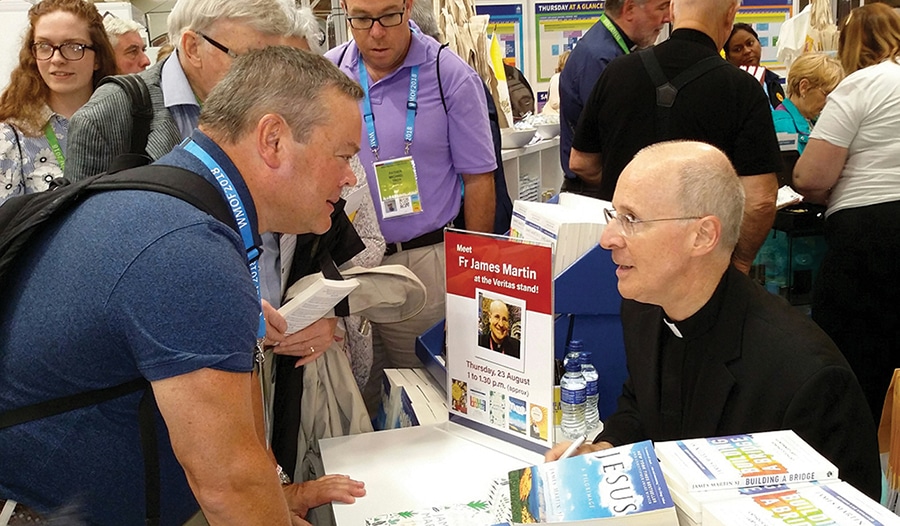
But the traditional teaching also has notable defenders among contemporary theologians, including the late Germain Grisez, longtime professor of moral theology at Mount Saint Mary’s Seminary in Emmitsburg, Maryland. No less than Father Martin, he argues for pastoral sensitivity toward homosexuals, writing in “Difficult Moral Questions,” the third volume of his three-volume treatise on moral theology, “The Way of the Lord Jesus” (Franciscan Press):
“The Church does not encourage or condone unjust discrimination against persons who are homosexual. She teaches constantly and most firmly that every human being has fundamental rights, flowing from the nature of human persons made in God’s image and called to share in divine life. On this basis, she insists that each and every person’s intrinsic dignity always should be respected in words, in actions, and by the law.”
At the same time, Grisez leaves no doubt that homosexual acts are wrong: “Though human sexuality’s meaning and value transcend the biological, sexual behavior fundamentally pertains to a person’s reproductive capacity. This basic meaning and value of sex grounds every other aspect of its personal and interpersonal significance, so that humans can fulfill themselves through sexual behavior only in marriage — the stable communion of a man and woman that is appropriate for having children and raising them.”
Homosexual acts, he adds, “cannot express and perfect authentic interpersonal communion; those who engage in them at best achieve only an unsatisfying illusion of intimacy and at worst simply use one another as means to self-satisfaction.”
An organization called Courage International now exists to provide pastoral support to men and women who experience same-sex attractions and wish to practice chastity in light of the teaching of the Church.
The group, which claims more than 150 local chapters in 18 countries, will hold its next international conference July 18-21 at Mundelein Seminary, near Chicago, on the theme “Courageous Friendship: Inspiring Hope and Renewal.” A clergy day to prepare priests, deacons, and religious to minister to persons with same-sex attraction will precede the event.
| (En) Courage International |
|---|
 Courage International has annual retreats and conferences for both men and women as well as priests. Upcoming events include the 2019 Clergy Study Day (July 11), a Spring Women’s Retreat (May 30-June 2), their Sports Camp XX (May 23-26), and the Annual Courage International Conference (July 18-21). The apostolate also has a sub-ministry called EnCourage, which is “dedicated to the spiritual needs of parents, siblings, children, and other relatives and friends of persons who have same-sex attractions,” according their website. The ministry supports members and their loved ones with chapters across the globe, including 71 in the United States. For more information about Courage International, visit their website: couragerc.org. Courage International has annual retreats and conferences for both men and women as well as priests. Upcoming events include the 2019 Clergy Study Day (July 11), a Spring Women’s Retreat (May 30-June 2), their Sports Camp XX (May 23-26), and the Annual Courage International Conference (July 18-21). The apostolate also has a sub-ministry called EnCourage, which is “dedicated to the spiritual needs of parents, siblings, children, and other relatives and friends of persons who have same-sex attractions,” according their website. The ministry supports members and their loved ones with chapters across the globe, including 71 in the United States. For more information about Courage International, visit their website: couragerc.org. |
The clergy abuse crisis
Lately, the Church also has had to wrestle with a particularly painful question: What role does homosexuality have in the sexual abuse of children by priests? The question appears unavoidable, considering that in 80% of known cases of clerical abuse in the United States the victims have been boys.
Researchers from New York’s John Jay College of Criminal Justice, commissioned by the Catholic bishops to study abuse, concluded in 2011 that “the clinical data do not support” the view that homosexuality was the cause. Rather, they said, “there is no single identifiable ’cause’ of sexually abusive behavior towards minors, and there are few individual characteristics that would make abusers identifiable prior to the commission of their abusive acts.”
| Accompanying Those with Same-Sex Attractions |
|---|
 “David Prosen has written a powerful booklet that I wish every Catholic adult would read. With incredible authenticity and transparency, he takes the reader into the interior reality — so often marked by wounds and pain — of those who experience same-sex attraction. Yet he also points the way to hope and healing in Christ, and the ways the Body of Christ can be a source of healing. This book will change the way you see the world.” “David Prosen has written a powerful booklet that I wish every Catholic adult would read. With incredible authenticity and transparency, he takes the reader into the interior reality — so often marked by wounds and pain — of those who experience same-sex attraction. Yet he also points the way to hope and healing in Christ, and the ways the Body of Christ can be a source of healing. This book will change the way you see the world.”— Dr. John Bergsma, Ph.D., Catholic Bible scholar, author, speakerPurchase your copy of “Accompanying Those with Same-Sex Attractions: A Guide for Catholics” (OSV $7.95) at osvcatholicbookstore.com. |
But not everyone agrees. Last year, Father Paul Sullins, an emeritus professor of sociology at The Catholic University of America, published a 45-page study based on an analysis of the data in which he found what he called an “extremely strong” correlation between a sharp rise in the presence of homosexuals in the clergy from the 1950s to the 1980s and the rise in sex abuse of children by priests in the same time-frame. He linked this to the emergence of “homosexual subcultures” in a number of seminaries during these years.
Pope Francis for his part holds that the chief cause of clergy sex abuse is clericalism — priests’ abuse of power at the expense of children. In closing remarks to the summit on abuse, to which he summoned Church leaders from around the world last February, the pope said it is up to the “People of God” to “liberate us from the plague of clericalism.”
But Cardinal Gerhard Müller, former prefect of the Congregation for the Doctrine of the Faith, says priests who abuse boys commit “homosexual crimes” and blaming abuse on clericalism confuses the means for committing the crime with the crime itself. “The offender’s will for sexual gratification is the cause of the violation,” he says.
On this, it seems, the debate will continue.
Russell Shaw is a contributing editor for Our Sunday Visitor.

